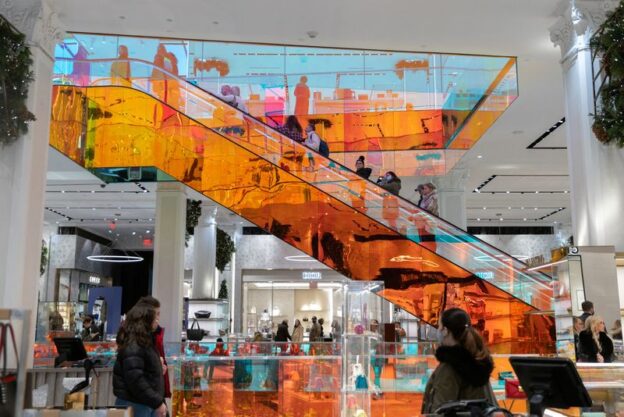© Reuters. FILE PHOTO: People ride escalator at Saks Fifth Avenue in New York City, U.S., December 4, 2022. REUTERS/Jeenah Moon/File Photo
PARIS (Reuters) – Luxury brands focused on wealthier consumers in the United States are performing better than those who appeal to aspirational shoppers on lower incomes who are deterred by the economic uncertainty, consultancy Bain & company said.
In its twice-yearly report, Bain increased its annual sales forecasts for the global personal luxury goods market – spanning clothing, accessories and beauty products – and expects growth of between 5% and src2% this year, compared to previous expectations of between 3% and 8%.
China is seen as a major driver of growth now that COVID lockdowns have been lifted, but, chiming with company results from retailers over the past weeks, Bain flagged further evidence that strong post-pandemic spending spree is waning in the United States.
“There is an overall slowdown mostly driven by the aspiration side of the customer and more entry prices, so categories like streetwear and sneakers are a bit underperforming as we speak,” partner Federica Levato told Reuters.
“Brands that are able to cater to the needs of the top customers … are the ones that perform better than others,” she added, noting a divergence between better-peforming labels and less successful ones in that market.
Many high end labels are shifting their merchandising strategies or pushing upmarket to cater to their wealthiest clients, seen more resilient to economic headwinds, as younger shoppers are under more pressure from rising prices than older generations with higher incomes.
For example, premium fashion retailer Hugo Boss last week raised its sales and profit targets for 2025 and said it continued to see strong growth in the U.S. and was expecting revenue to grow in the Asia-Pacific region.
Lovato said that while there were “some questions marks” about China, and possibly a slowing of sales growth with the middle class, there was still appetite there.
Luxury sales stood at 345 billion euros last year, according to Bain.

Comments are closed